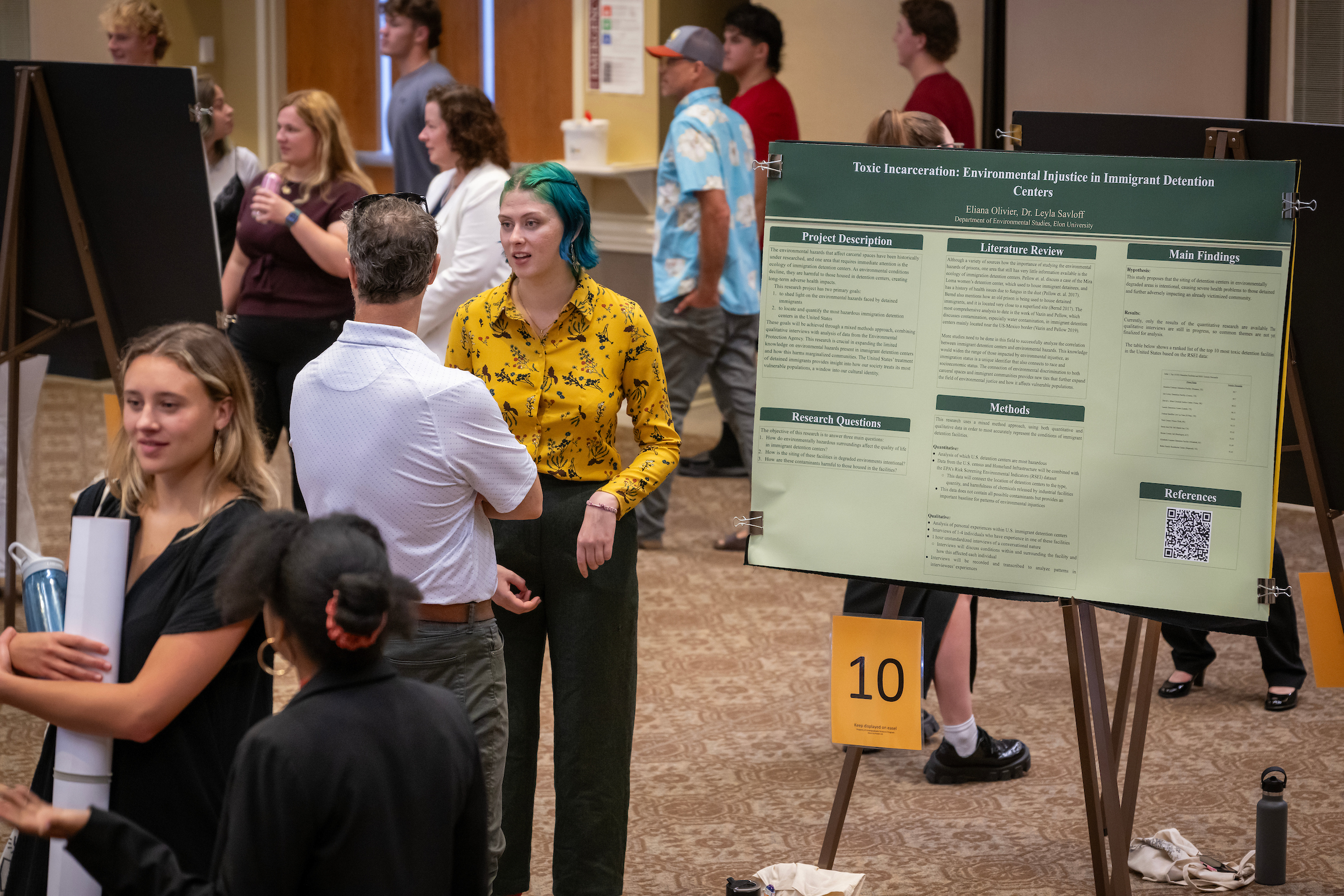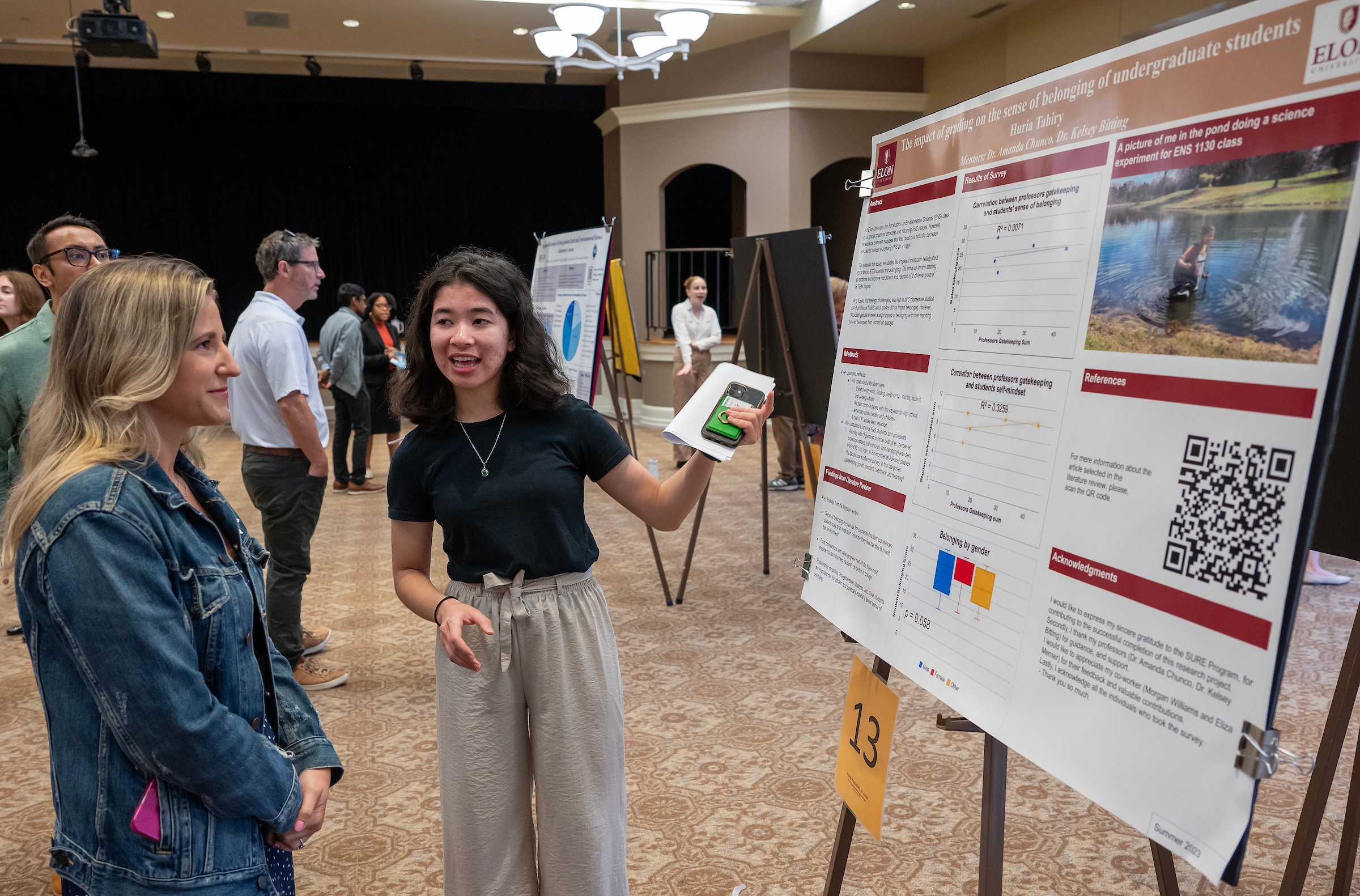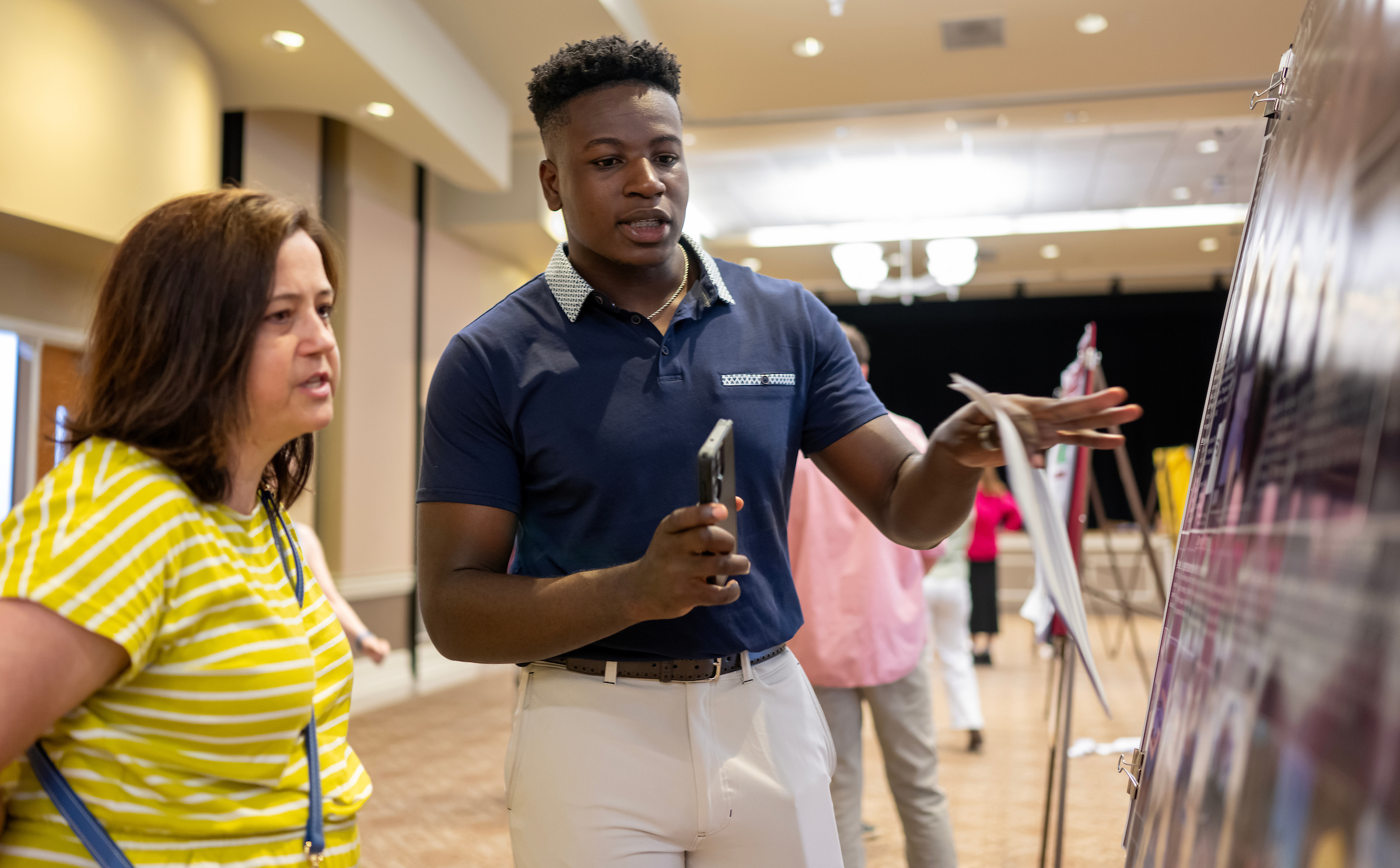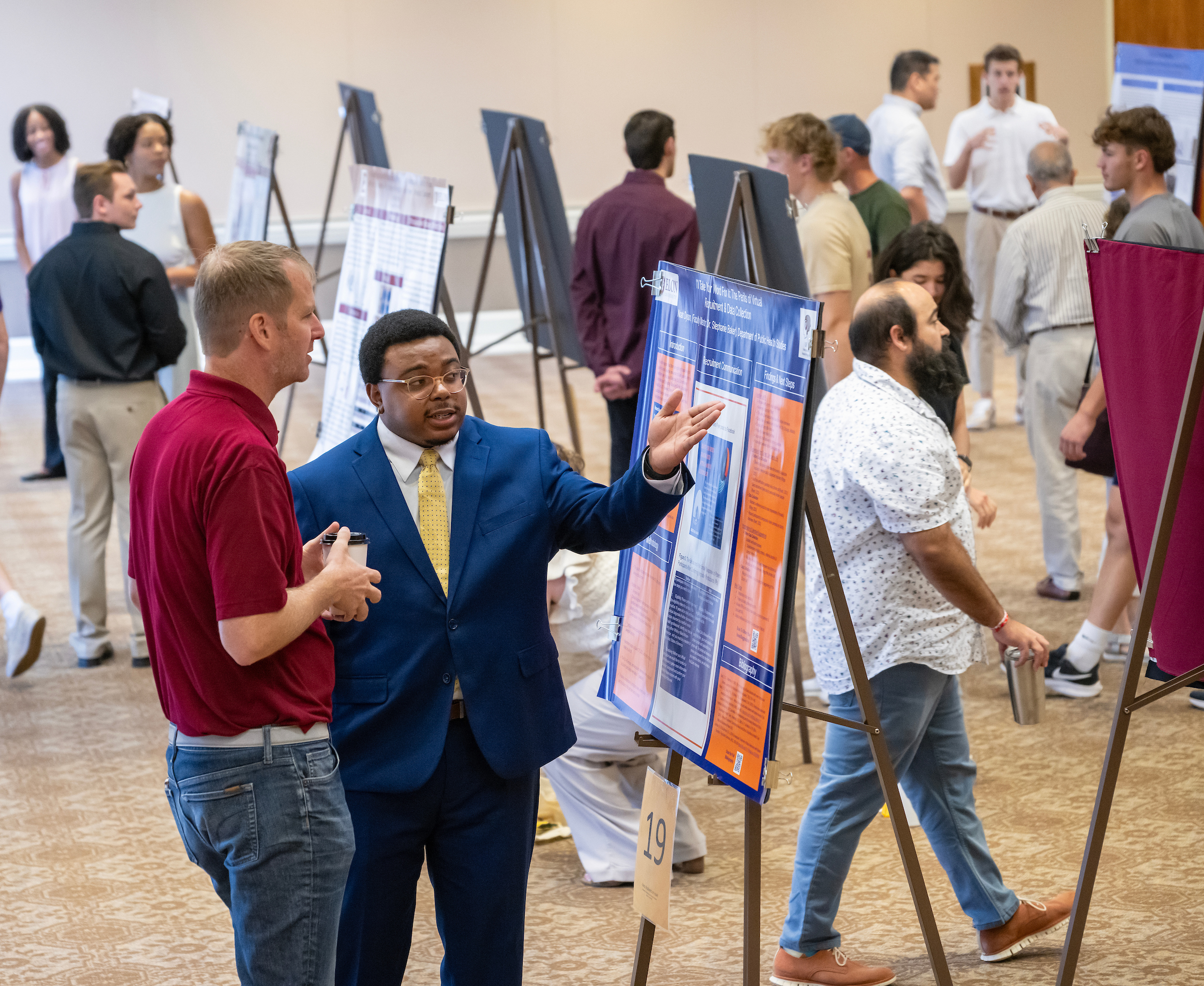Elon University / Today at Elon / SURE showcases wide-ranging research of Elon students, mentors

[ad_1]
Forty-five research programs covering a multitude of disciplines were on display during the annual Summer Undergraduate Research Experience (SURE) on Wednesday, July 19.

SURE has become a signature event for students and their mentors to delve into research without the distractions that can come with the academic year. Undergraduates and their faculty mentors devote time and resources outside of the main academic year to specific areas of interest. The students and mentors receive a $3,000 stipend to work full-time on projects that can extend past the eight-week program and eventually to peer-reviewed publications and conference presentations.
“SURE is one of our premier events that the Undergraduate Research program offers. It is an intense, focused opportunity for both students and faculty to engage in their research,” director of undergraduate research Eric Hall said.
“We culminate the program with the poster session to help students and mentors see the progress that they have made over the summer, but also to practice presentation skills that they will hopefully utilize in future conference presentations as their research continues to progress,” Hall added.
There are numerous workshops offered throughout the summer to help students develop personally and professionally, focused on developing skills for career readiness. These workshops are put on by librarians, staff in the SPDC and the Writing Center.
Ashley Burnett ’24 took an unorthodox route for her project, as she spent her summer attending music festivals. Her project, “The Creation and Curation of Festival Culture,” was birthed in a course she had taken about the rapidly evolving and colorful religious world in the last 50 years due to the influences of technology, social media and other factors.
In this course, she learned about various festivals that have spiritual elements and it raised the question: could the same be same apply to music festivals?

Using parallels between religious imagery and the elements of music festivals — the performers and deities, the stage and the altar, the connections built over a common interest — Burnett suggests that it can. She argues that offers a lot of the same appeals of traditional religion to a younger demographic who identifies as less religious.
“I was mainly interested in the idea of youth spirituality and one of the main things I’m trying to argue is that these festivals can be seen as inherently religious for the people who attend,” Burnett said.
“[This project] opened the idea of new spirituality … and my generation choosing to be spiritual and this is a great outlet to be spiritual. You get the same feelings that you would in a church but on a new level,” Burnett said.
Burnett worked closely with her primary mentor Lecturer in English Kathleen Crosby but also with other faculty members Brian Pennington, Amy Allocco and Sandy Marshall who offered significant guidance.
“Research is not just one mentor. It’s a cohort of mentors that are helping you along the way,” Burnett said. “You may have one primary one but that doesn’t mean there aren’t others willing to step in and help. I’ve grown so close to my professors and I’ve loved it.”
Khairi Morrow’s background in West African dance and academic interests as a public health and dance science double major inspired her project, “Feel the Beat, Connect the Energy, Understand the Culture, Heal the Heart.”
The central question of her project is, how West African dance can impact risk factors for cardiovascular disease and psychosocial measures in Black women between the ages 40 and 65? The answers are multifaceted.
Black women have the highest rates of cardiovascular disease in terms of death due to the stress that’s been put on that minority group between systemic racism with societal pressures. Morrow said this is also a result of Black women taking on more than they can handle without prioritizing their wellness.

“I wanted to provide a space where they can do that but also understand and learn about that,” she said.
Morrow worked with a group of Black women through dance sessions of the West African Kuku rhythm, informational sessions about West African dance and cardiovascular health, and self-care opportunities such as painting and meditation.
“I truly believe, and it does show, that Black women need these spaces. One, to help advocate for themselves but also to take care of themselves,” Morrow said. “There is no kids, no partner, no work or anything [in these sessions]. Just them and a sense of community in these spaces.”
Morrow plans to develop a curriculum for Black women to have a continuous space for self-care and community. She will continue her research in Cape Town, South Africa and conduct a comparison analysis while there.
The words of wisdom from her project mentors Associate Professor of Exercise Science Titch Madzima and Assistant Professor of Dance Keshia Wall were invaluable for her research, Morrow said.
“I really felt like it was a family more than just a partnership,” Morrow said.
Grant Doherty ’24 focused his project on the “apprenticeship of observation,” a term first coined in 1975 that describes the influences that K-12 experiences have on prospective teachers’ understanding of education.
But as the apprenticeship of observation includes new elements of technology allowing the next generation of teachers to observe more teachers through different lenses. Many teachers are on social media and due to the amount of time teens spend on these platforms, Doherty said it was appropriate for him to investigate how prospective teachers have been influenced by what they observe.

“This is really important because there are ways that you can be influenced by social media in a negative sense,” he said. “You can see bad teaching practices and when you go into a classroom, you take those bad influences with you.
“One of the things we’re focused on is what are the positives and the negatives and how do we extract more positives,” Doherty added.
In the 11 interviews with pre-service teachers, many indicated that they would research methods further after watching on social media. Doherty plans to continue interviewing with pre-service teachers from outside of Elon and further articulate the opportunities and challenges associated with new digital apprenticeships of observation.
Doherty’s faculty mentors for the project were Jeffrey Carpenter, director of the Teaching Fellows Program, and Scott Morrison, associate professor of education. Their expertise and concern over this topic were a constant inspiration for Doherty on this project.
“It’s really nice to be working with someone who cares so much,” Doherty said. “They’re just as invested in the research as I am.”
[ad_2]
Source link
